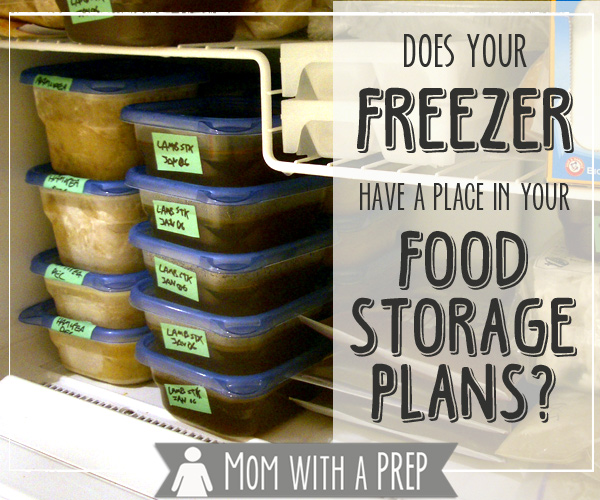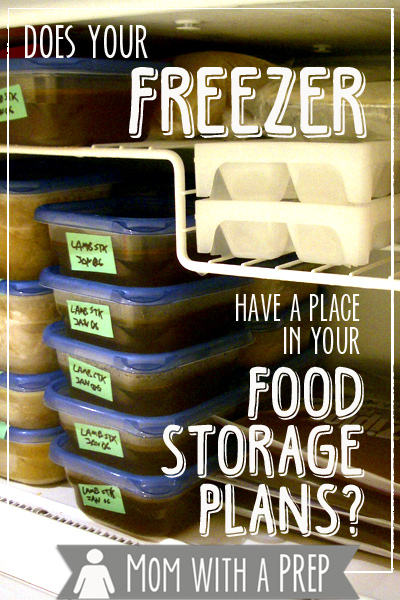Does your freezer have a place in your food storage plans? I believe it does! Use your freezer to help build your food storage for an extended food storage pantry. Just don’t make it your only tool.

I know…I know. I’m ready for the barrage of blog comments, Facebook comments and Pinterest comments on this one. It’s VERY controversial in the preparedness community, but I think it’s something that everyone should be deciding for themselves.
Has there ever been a time when you look at your extended food pantry and think, “I just don’t have the energy or the time to create a meal from scratch right now. ”
Or maybe your next door neighbor is experiencing a sudden death or welcoming a new baby, and you want to be able to give them a ready meal for dinner tonight?
Or maybe even a surprise girls’ weekend out, and you’d like to make sure your family is living off of more than drive-thru or frozen pizzas from the store.
Or Mom and Dad have the flu, and one more can of soup will make you crazy? The kids still need to eat.
In these scenarios, and more, my freezer plays a vital part in my food storage plans.
Why plan for the not-so-worst case scenario
I like to stress over and over again that not every personal world-ending scenario plays out like a scene from Mad Max. For some of us, it’s both parents losing their jobs and having no savings to live on, or having the bread winner leave the family, or there being a local weather disaster that leaves you unable to get anywhere for awhile.
Even experiencing something as our family is experiencing now – both parents being down with the pneumonia and preparing a bunch of food from scratch isn’t really an option for every meal. Preparedness is about being prepared for whatever comes to ‘rock your world’, not just an apocalyptic experience.
In any of these cases, the power isn’t necessarily out for you, but making meals from your food storage might not be an option, or you’re tired of eating spaghetti rings from a can.
Using your freezer for long-term food storage goals
So how can you use your freezer in your food storage plans?
- Stocking up on meat when prices are rock bottom.
- Preparing meals ahead of time that can store and be ready at a moment’s notice, not only for your family, but as a help for another family in need (new baby, sickness, taking on extra family, etc.)
- Storing garden bounty when you just can’t can quickly enough and your dehydrator and canner are already running at maximum.
- Storing doughs, fruits, cheeses and other meal components in bulk. Even milk and eggs and my favorite – BUTTER!
Tips when storing in the freezer:
- Be sure to leave no space unfilled – while you do want to give liquids a little space to expand into, with most freezer products, air space is bad. Fill things to the top with the smallest amount of head space you can to help prevent freezer burn.
- Cool things in the fridge completely before storing in freezer – any warmth in your food can cause bad bacteria. Don’t freeze warm foods as the time they are in the danger zone can be elongated. It also causes ice crystals to form which is another way to decrease your food’s longevity.
- Wrap, double wrap, and even triple wrap if necessary.
- If you have a Food Saver or other vacuum sealing device, make use of it in those foods that you plan on storing long term ( 3 months or more depending on the food). This storage method words better than double packing in freezer zip-top bags. The investment is worth keeping your food at it’s peak flavor.
- Keep your freezer frost-free. It works more efficiently, keeping your food at its best.
- Break down foods into smaller serving sizes, and out of cardboad packaging if you can. It is a more efficient storage system, and keeps your food longer if you can store it in the best containers possible.
- Use baskets and markers to help organize and identify products so that they don’t get lost.
- Fill unused space with jugs of water that will freeze and help your freezer work more efficiently, and serve as a way to keep the freezer going should the power go out.
What If the Power Goes Out?
- Do not open the freezer if you can possibly help it.
- Wrap your chest freezer in blankets to help sustain the freezing time if your situation looks to be short-term issue. It will help insulate the freezer to extend the safe time your food is available.
- Hopefully you’ve followed the advice to fill extra space in the freezer with old water jugs full of water to create freezer packs that can help extend the cold capacity of your freezer until the power comes back on.
- Use dry ice to help if you have access. A large block of dry ice can keep your food frozen for extra days. Be sure to follow all safety precautions when using it (gloves, don’t breath in the fumes).
- Have a plan – know what you plan on doing with the food in your freezer if the power is not going to be back on in time to save your food. You don’t want to take the chance of eating food that has been in the danger zone for long. You can have a neighborhood grill-out, can or dehydrate food, cook what you can eat safely).
- If you have a generator, make sure to plug your freezer in for a time period each day to keep the temp down. It does not have to run 24 hrs a day on the generator, you want to give it a power up each day. Depending on your wattage, you can get by with 2-4 hours per day for the freezer.
- Foods that have been above 40F for more than two hours are considered unsafe to eat by most USDA/FDA government entities (have to throw that in there 😉 )You can read more tips here: FREEZER SAFETY TIPS FOR A POWER OUTAGE
Sure, canning and dehydration are our best options for long-term food storage without power. You can also invest in freeze dried foods and kits. I, however, still like the convenience ready-made meals that I can pull out at a moment’s notice. I love the convenience of pulling out a meal for a friend when I hear they are in need and dropping it off. I love having breads and muffins always ready for quick breakfasts for my kids during the summer so we don’t have to heat the kitchen.
I love the freezer as another tool in my deep pantry arsenal.
As I become more proficient with my dehydrating and canning, I will begin to store more meals that way. But I don’t want to give up my freezer for the awesome food storage it gives me on a day to day basis. I just know that I can never rely on it being my ONLY food storage option. You must have redundancies and backups!

Becky is a wildlife enthusiast and pet and livestock care expert with a diploma in canine nutrition. With over a decade of experience in animal welfare, Becky lends her expertise to Simple Family Preparedness through insightful info about pets, livestock, bee keeping, and the practicalities of homesteading.

